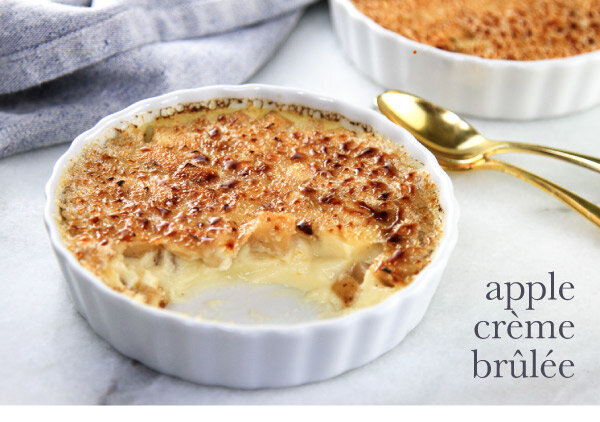Brûlée means “burnt cream.” The dessert consists of a vanilla-rich custard topped with a layer of caramelized sugar. The sugar transforms to a thin, hard crust with a subtle burnt flavor that perfectly complements the sweet custard. With just five ingredients, the making of crème brûlée is all technique. Once mastered – and it’s easy to do so -- this dessert will become a signature dish in your repertoire.
Apple Crème Brûlée
Serves 6
Ingredients:
3 medium tart apples (we used Pink Lady apples this time), peeled, cored, 1/4" dice
2 tablespoons butter
1/4 teaspoon cinnamon
1/8 teaspoon cloves
1/8 teaspoon nutmeg
2 tablespoons brandy
3 cups heavy cream
1/2 cup granulated white sugar, divided
1 tablespoon vanilla extract
6 large egg yolks
1/8 teaspoon Kosher salt
Topping:
1/4 cup white sugar
1/4 cup brown sugar
Directions:
1. Prepare the apples by peeling, coring, and dicing into a small 1/4” dice.
2. Sauté the apples for about 10 minutes. In a large skillet, melt the butter and sauté the apples until fully softened. Deglaze the pan with 2 tablespoons of brandy. Season the cooked apples with cinnamon, cloves, and nutmeg. Divide the cooked apples evenly into each of the ramekins.
3. Preheat the oven to 325°F. Place the ramekins in a large rimmed baking pan.
4.In a saucepan, heat the cream, and add 1/4 cup of the sugar. Add the vanilla extract and bring to a simmer – just short of a boil.
5. Meanwhile, in a medium mixing bowl with a hand mixer, beat together the egg yolks, the other half of the sugar (1/4 cup), and salt until well combined and slightly lightened in color.
6.Temper the egg yolk mixture by drizzling in a half a cup of the warm cream while continuously whisking. Repeat the addition of warmed cream in increments until all is added. Go slowly to avoid scrambling the eggs!
7. Pour the mixture through a fine sieve to remove any curdled egg. Skim off any foam that forms on the top of the mixture. Pour the strained mixture into the apple-filled ramekins filling them nearly to top.
8. Place the baking pan of ramekins in the oven. Carefully add water to the pan to surround the ramekins to a height halfway up the sides of the ramekins.
9. Bake at 325°F until the custard is set – that is, when the edges are set, and the center is thickened yet still has a little jiggle. Baking times will vary based on the type and size of ramekin used. For the ramekins we used (1/2-inch custard depth), we baked them for 35 minutes; bake deeper ramekins for a longer period of time – as much as 60 minutes.
10.Carefully remove the ramekins from the water and cool on a rack. Cover each ramekin with plastic wrap and chill thoroughly for 4 hours or up to 3 days.
11. Just prior to serving, remove the ramekins from the refrigerator and pat the tops of the custard with a paper towel to remove any condensation or weeping. Sprinkle superfine sugar on top of the custard to cover in a thin, even layer. Using a culinary torch, heat the sugar top using a sweeping circular motion to melt the sugar. When the sugar is melted and turning an amber color, move on to the next ramekin. The liquid, caramelized sugar will cool quickly and form a thin, hard crust on top. [Alternatively, place the ramekins under an oven broiler to caramelize the sugar. Frequently rotate the pan holding the ramekins for even exposure to the broiler’s heat. Watch carefully to avoid burning!]
12. Serve immediately for maximum crackle in the crust (vs. a softened crust which can happen over time). We like to serve our crème brûlée with demitasse spoons to savor each small bite.

